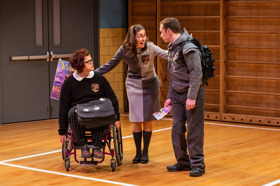Review: TEENAGE DICK, at Artists Rep, Explores Social Dynamics in One of World's Harshest Environments: High School

TEENAGE DICK is a high school adaptation of Shakespeare's Richard III, a play about lust for power and revenge written during a time when a physical disability was thought to indicate a moral failing. There's a lot to unpack here, so to get straight to the point: Don't let the fact that it's set in high school scare you. Artists Rep's production of this play, which was a 2018 NYC Critic's Pick, is very much worth a watch.
Richard III, one of the greatest villains in English history, has also been characterized as the most famous disabled character of all time. Amazingly, it took until 2017, almost 400 years after the first performance, for a disabled actor to be cast in the role.
In a promising sign of progress, the next year, Mike Lew's TEENAGE DICK opened Off-Broadway. In an interview with the Playwrights Foundation, Lew said his goal is "to re-examine tired tropes about the disabled, create stories for people we're not otherwise seeing, hire more disabled artists, and carry out a ground-up reconsideration of how theaters embrace the mantle of inclusion."
Like in the original, the title character in TEENAGE DICK has a disability - cerebral palsy - and Lew specifies that not only Richard, but also his friend Buck, must be played by actors with disabilities. He also challenges the idea that we can tell anything at all about a person from their physical appearance in the first place. "[T]his play is...about clocking social dynamics - the way we tend to project assumptions onto people rather than taking them in," he says.
And what better place to set a story about social dynamics and the consequences of judginess and exclusion than high school.
In Shakespeare's play, Richard wants the throne, and he has to do away with several people ahead of him in line to get it. In TEENAGE DICK, he wants the senior class presidency.
Standing in Richard's way are Eddie, the junior class president and football quarterback (with all of the stereotypes that entails), and Clarissa, a devout Christian who thinks the presidency is her ticket to Stanford (and that disabled students don't need extracurriculars to get accepted into college), as well as a general belief that someone as unpopular as he is could never win anyway. To prove them all wrong, Richard develops a plan that includes enlisting Buck, a TA, to alter his classmates' grades and wooing Anne, Eddie's ex-girlfriend. As Richard progresses with his machinations, he comes to a crossroads where he must decide between love and getting the revenge he's been chasing all along.
I liked just about everything about TEENAGE DICK. Lew manages to hit many of today's major issues -- not just disability inclusion, but also bullying, sexism, the role of religion in politics, and a lot more -- with a sharp script that blends elevated Shakespearean language with social media slang and everything in between.
The acting is also excellent. Christopher Imbrosciano and Tess Raunig, who both have cerebral palsy, are stellar as Richard and Buck. As several other reviewers have pointed out, the scenes between the two of them, in which they grapple with the social mess that is high school, which is compounded by their experiences as people with disabilities, are some of the most powerful. Kailey Rhodes continues her streak of emotionally nuanced performances as Anne, the most popular girl in school, but also someone with a secret. I also really enjoyed Ayanna Berkshire in the role of Elizabeth York, the harried English teacher who demonstrates how becoming an adult doesn't prevent you from blinded by bias.
So, notch up another point for Artists Rep this season and go see TEENAGE DICK.
TEENAGE DICK runs through February 3. Details and tickets here.
Reader Reviews
Videos

